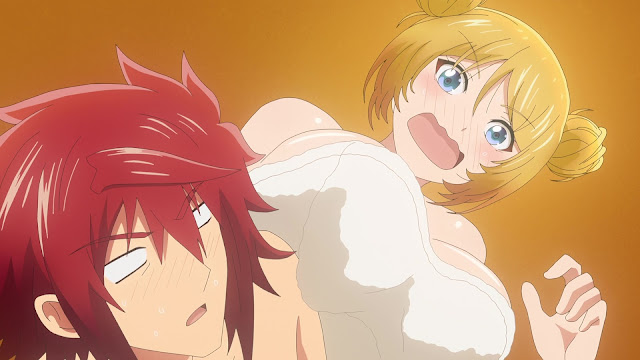If there is one particular category that appears to divide the anime connoisseurs, it would undeniably be that of Ecchi. Ambivalence for these shows is rare, as fans either hate or love them to an extreme. Sex sells, but at the same time, sex ostracizes, so the push and pull related to these kinds of shows is understandable. The argument that Ecchi serves no purpose is moot. Instead, some thought should be given to why it's there in the first place. To understand why this is the case requires more than just a brief overview, but rather a thorough investigation of socio-economic issues. As popular as anime has become outside of Japan, for most studios, appealing to Western audiences is still far from a priority. After all, they're providing content for a home-grown demographic. And when creating content for such a niche environment, key issues aren't present with other viewers.
Life in Japan is significantly different than life in the West. The importance of social ethics, fitting in, and going above and beyond for one's workplace isn't as big of an issue elsewhere. When all those things are considered, it becomes apparent that the primary target audience for these programs lacks the necessary time and opportunities to engage in romantic pursuits, dating, or just being inappropriate with their friends. As such, incorporating lascivious and lewd scenes to already escapist shows only further allures a substantial portion of what was meant to be the main viewers.
Recently, Ecchi as a medium has gotten ever more outlandish. Titles such as Redo of Healer, Inter-species Reviewers, Harem in the Labyrinth of Another World, and Immoral Guild threaded a seemingly invisible line between anime and hentai. As shows like these dominate the discussion on ecchi anime, it leads to more subdued ones being placed on the sidelines. Unfortunately, this is problematic for several reasons, primarily because shows like those heavily rely on their lubricious nature to captivate their target viewers. Since these titles are lauded as 'peak Ecchi.' This may lead to the erroneous belief that all shows within this genre possess this same overt and flagrant approach, but that is untrue.
To say TenPuru is breaking frontiers is laughable; very little stands out about the show compared to others in the genre. With modern-day consumerism and the vast amount of available media, one would think anything that isn't groundbreaking would be worthless. However, there's a reason why tried-and-true methods still hold weight, and this is where TenPuru shines. At no point does it try to be a grand show, a hypersexual heavyweight, or rely on cheesy sentimental scenes to try to be something else; it's just unabashedly a comedic Ecchi meant to make us laugh. It doesn't try to make pretensions or push limits; it’s only there to entertain.
The story centers around Akemitsu Akagami (VA Masayuki Akasaka), a college student who is fixated on rejecting the promiscuous lifestyle that his father had. Because of this, he forgoes logic and ventures into the extreme, renouncing any semblance of what he thinks of as "worldly desires." But as he finds himself experiencing day-to-day attraction and lust to quell what he sees as licentious behavior, he sets off to join a temple to rid himself of the thoughts that plague him. While his intentions may be perceived as noble, how things play out initially is far from it. During his first visit to Mikazuki Temple, he accidentally encounters Yuzuki Aoba, who is partially undressed. In a moment of impulsiveness, he proposes to her, driven by his lust-driven state. Proving you don't need to waste 12 episodes of flirting just to get blocked by a fireworks display when you finally work up the courage to confess. As he tries to escape from the situation he finds himself in, he falls and concusses himself. Upon seeing his disheveled appearance, Yuzuki offers him shelter for the night at the temple, which has recently been converted into a nunnery. However, through the whims of fate, it is revealed that Akemitu's father owes a substantial debt to Mikazuki Temple, and he promises to pay back his dad's debt while working at the temple.
(Akagami-kun and Yuzuki's first meeting and introduction)
The story then proceeds in a manner typical of Ecchi anime. The other girls at the temple try to get him to leave by resorting to everything from seduction to violence. But inevitably, one after the other fails and instead ends up with some either appreciation or attraction for Akemitsu. While tried and true, there is enough absurdity in how things happen to keep fans of the genre entertained. An applause (pachi pachi) has to be given to the vocal cast. This is especially true for Mia Christoph's VA (Madoka Asahina), who goes above and beyond in matching the ridiculousness of what we're seeing on screen with just the right cadence and inflection. Hearing someone so eloquently reflect everything from excitement to embarrassment is astounding. Likewise, Masayuki Akasaka does a stellar job of voicing Akagami. His deep voice, which keeps its pitch regardless of the emotion, perfectly fits someone as downtrotted in life as Akemitsu.
(The several failed attempts to get rid of Akagami-kun by the resident temple girls)
The show heavily leans on slice-of-life elements, as family and personal scenes are plentiful. The interaction between the sisters gives a nod to shows like Minami-ke, as the interaction between siblings is less idealized and more normalized. But make no mistake, the draw of this show is the sexually charged humor. Bawdy humor abounds and is made even more comical because, unlike most sketchy or oblivious MCs, Akemitsu desperately tries to avoid the exact situations he finds himself in.
(While backgrounds may be a bit dull, the characters and main view artwork is always vibrant and attention grabbing)
Repetitive doesn’t necessarily equal mundane; there's enjoyment in most things when presented a certain way. TenPuru does an eloquent job of doing just that. It rehashes the tropes of the Ecchi shows of old in a way that is less ripoff and more flattery. Coupled with old-school Ecchi humor, it can boast having vibrant and pleasant artwork, though you can expect an off-scene or two in every episode. And throughout the show, you'll definitely see some slack in the animation. But that's understandable when you realize shows like this usually have a lower budget. Is TenPuru a genre changer? No? Does it deserve to be treated like a run-of-the-mill Ecchi show and ignored? No, the absurdity of the situations that the characters find themselves in is definitely worth watching.










